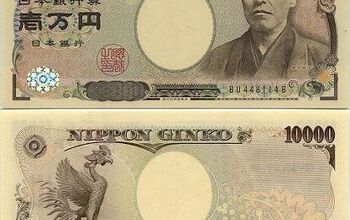Stabenow's Japanese Currency Manipulation Act: A Yen For Stupidity
As Detroit slips into a quagmire of its own creation, The Big 2.5 are busy flexing rapidly wasting political muscles. On Tuesday, the top brass met with President Bush to forestall discuss plans for greater fuel efficiency. The next day, Senator Debbie Stabenow (D-MI) introduced The Japanese Currency Act. Like her Motown home boys, Stabenow claims the Japanese government is manipulating their exchange rate to provide an inherent– and inherently unfair– “discount” over American-made products. Uh, I don’t think so.
There are plenty of reasons to dismiss this legislation as End of Days insanity. First, there’s the timing. If the yen – dollar exchange rate is such a pressing problem for Detroit automakers, why did Stabenow hang fire until after the recent elections? Indeed, The Big 2.5 has been losing ground to Japanese-owned automakers for decades. If [alleged] Japanese currency manipulation wasn’t a problem ten years ago, why should anyone believe it’s a problem now?
Second, the proposed bill directs the U.S. Department of Treasury to work with the Council of Economic Advisors and the Japanese government to devise a plan to draw down Japan's “excessive currency reserves." The Act is a patently ridiculous effort to interfere with one of America’s best trading partners and a key strategic ally. It’s an entirely theoretic maneuver that’s doomed to failure; the Japanese Finance Ministry is about as likely to embrace foreign dictates as the U.S. Federal Reserve Board.
Third, while government bodies can manipulate foreign exchange rates, there are obvious limits. Remember when the Euro came out and dived against the dollar? Nothing the Ministers could do helped stop the rot. In fact, any country with open capital markets can only slow currency valuation trends– not create, prevent or stop them.
Even if the Powers that Be conspired to set the Yen at a more Detroit friendly level, the impact on the U.S. car industry would be minimal. The Automotive Trade Policy Council– a Detroit political mouthpiece– says the exchange rate delivers a $4k to $10k per vehicle “windfall” to Japanese automakers. Even if you accept this logic (and forget about the cost of Japanese labor and transportation), we’re talking about a tiny slice of the Dai-san’s U.S. business.
Ironically enough, Japanese automakers moved most of their production overseas in the mid-‘90’s to head off the impact of the (then) strong Yen. Nowadays, only Toyota’s Lexus and Scion models are made exclusively in Japan. Honda’s CR-V is their last home-grown U.S. export– and they’re shifting production stateside. While a rate-based “discount” on transmissions and some electronics (the major imported components) may help, their competitive advantage is not what you’d call overwhelming.
And what of the reverse? While virtually all its factories are in Japan, Mazda has not been able to lift up Ford. If a Japanese production base gives foreign automakers such a large cost advantage, why did GM and DCX recently cut ties with their Japanese “little brothers”? If access to cheap Yen is truly a great advantage, why are Isuzu and Mitsubishi wallflowers at the automakers’ ball?
Abandoned by their foreign “partners”, these Japanese automakers have been unable to hook up with new partners– and it’s not for lack of trying. Suzuki has apparently decided to use whatever Yen-based “advantage” they possess to make a big push in the Japanese domestic market. When the one Japanese carmaker with no US manufacturing capacity makes its major market push outside the U.S., it tells us that the days when “made in Japan” meant cheap (in any sense of the word) are long gone.
So why does the Yen remain relatively weak, when the Euro and Pound are getting stronger? While most Japanese car and electronics makers are doing well (some more than others), the Japanese economy is in the same slump it’s been in for the last 15 years. Despite government rates that are a tenth of those of the US and Europe, Japanese banks are still “weak.” They’re still saddled with tens of billions of dollars worth of outstanding loans made during the economic “bubble” of the late ‘80’s. Loans they can’t afford to write-off.
Bottom line: Japanese banks aren’t lending much money. Japan’s economic growth is practically flat, with a shrinking and aging population. What’s good for Lexus– a booming Japanese economy– ain't happening.
If the The Japanese Currency Act is so wrong, so late and so feckless, why make the gesture now? The timing doesn’t match plant closings. It doesn’t smack of Big 2.5 Head-Honcho-dom; the Fat Cats only complain about exchange rates when they need a convenient excuse for lackluster sales.
Nope. The bill’s likeliest target are the people most in sync with its paranoid xenophobia: the United Auto Workers. To this receptive audience, Stebnow's Act makes it sound like “something is being done”. Which is true enough: precious time and energy are being wasted on an unimportant non-issue.
More by Andrew Dederer
Latest Car Reviews
Read moreLatest Product Reviews
Read moreRecent Comments
- ToolGuy TG likes price reductions.
- ToolGuy I could go for a Mustang with a Subaru powertrain. (Maybe some additional ground clearance.)
- ToolGuy Does Tim Healey care about TTAC? 😉
- ToolGuy I am slashing my food budget by 1%.
- ToolGuy TG grows skeptical about his government protecting him from bad decisions.

































Comments
Join the conversation
Lets see - if there is a trade imbalance, one currency is supposed to strengthen and the other weaken until there is zero trade balance. Yes that is the key to free trade. Under Paul Volker, US interest rates were set very high, and the dollar strengthened dramatically. Oh, but you say this can't happen. Was there not cause and effect? Cleary the Fed's action impacted the currency exchange rates. But Japan cannot do the same? Japan, under prodding from US, allowed their currency to strengthen - to a point. OK, time now for some fairy tales- China's currency is really a different situation than Japan's. While George Soros and hedge funds do manipulate currencies, Japanese politicians for some reason are different than any other on earth. If the Japanese yen is shoved higher, and all Japan inc is shut down, they would stand idly by. Despite having the largest foreign reserves on earth, they would not buy dollars and sell yen, or keep their interest rates artificially low. They would just say nothing could be done because PCH says it can't be done. And Elvis is living in Las Vegas incognito. And the Easter bunny is going to bring us all chocolate eggs this Sunday. And slim gray aliens beamed PCH up for an evaluation.